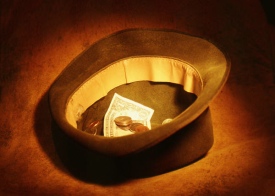
I recently heard Doc Searls talk about his interest in developing a method to send money to musicians, radio progams and other forms of streaming entertainment. If you like something, you should be able to show it by putting your money where your mouth is. It’s a thought provoking idea that challenges the underlying fundamentals and economics of a well established industry.
Presumably some kind of name space would need to be developed for the recipients of payments– a URI that could be addressed from a distributed set of listening contexts. The basic idea is that the listener can set the terms of the transaction, in some ways it’s like the traditional tip jar or passing the hat. I’m not clear if the intention is to link to existing micro-payment systems or to develop new ones, but presumably there would be more than one transaction mechanism.
Much like Wikipedia and other social projects, the idea of creating a real economics for musicians based on voluntary payment has been met with skepticism. Kevin Kelly draws the boundaries of the economic system in his post 1,000 true fans. The gist of the contention is:
A creator, such as an artist, musician, photographer, craftsperson, performer, animator, designer, videomaker, or author – in other words, anyone producing works of art – needs to acquire only 1,000 True Fans to make a living.
A “true fan” is someone who will buy everything an artist produces. Obviously to yield 1,000 true fans an artist may need ten or twenty times as many regular fans. Kelly’s post attracted a number of responses, including one Kelly noted from Jaron Lanier:
Jaron claims that he has not found a single musician that meets this definition. In other words, he claims that there are no musicians who have risen to a successful livelihood within the new media environment. None. No musician who is succeeding solely on the generatives I outline in Better Than Free. No musician born digital, and making a living in the new media.
Kelly followed up with two posts: The Case Against 1,000 True Fans and The Reality of Depending on True Fans.
Doc Searl’s proposal would shift the responsibility of developing payment modes from the artist to a payment system. This is a key friction point for artists, they’re good at making music not managing micro-payment systems. But for me, another question emerges: if I like the song “While My Guitar Gently Weeps” what are my payment options?
- The Beatles
- George Harrison
- Eric Clapton, for that guitar solo
- George Martin, as producer
- Prince, for that guitar solo (RRHOF version)
Who owns which part of a performance? Can they be addressed separately? What about multiple versions of the same tune? What about cover versions? Can a performance be addressed as a complex network? Can we make it easy to pull that one thread from the cloth? Is there a viable Buddhist Economics that can emerge from this confluence of efforts?
The framing of a performance contributes to its total value. This would be true of a performance encountered somewhere on a distributed Network as well. Virtuoso violinist Joshua Bell recently played unannounced in a subway station. That venue, as opposed to a concert hall, altered the audience’s perception of the value of his performance.
Joshua Bell made $32.17 as a busker. He commented:
“Actually,” Bell said with a laugh, “that’s not so bad, considering. That’s 40 bucks an hour. I could make an okay living doing this, and I wouldn’t have to pay an agent.”
Great discussion. There's going to have to be an organization set up in the general framework of ASCAP and BMI to get so called royalty payments to small musicians. I don't mean small like very short people. Anyway, in my opinion, it should be set up by musicians and run by musicians for the purpose of making sure that us guys who rely on the internet for our exposure to the public have a guaranteed way to get paid for our service. If a fan wants to contribute (internet tips) they can do so and whoever the artist is gets the money in the form of a monthly payment. Or something like that. There should also be parameters set up so that people with lots of money and fans like Metalica can't come in and wreck the thing. This would be in lieu of having to have a manager or agent to take care of this stuff. There's already of course the sites like Itunes where people can get paid for having their music downloaded, but the whole thing seems to be very disconnected and all over the place, plus most of the folks who download from there are getting the latest major label stuff and not being turned on to the smaller guys. Maybe we should have our own thing, our own site, our own community, to promote and sell our music on the web, and maybe anybody with more than 5000 true fans should graduate to the major league.
It's very refreshing to see this discussion taking place not only among artists, but also music consumers. Those of us who truly care about music and its creators are looking for the right thing to do rather than simply accepting the old model's iniquities.
As an artist, I believe in enriching the lives of my audience, and in the process enriching my own life. I want to do that every hour of every day, and thus far, it has not been possible. But as the sands shift, something amazing is beginning to take form. It has inspired hope in me for the first time since I naively entered the dogfight ring of the music industry over a decade ago.
Music done properly is communication. The same is true of social networking. If these forms can dovetail, the world will be better for it.